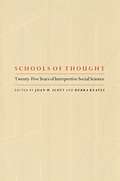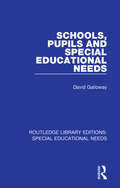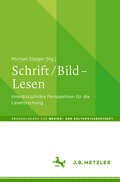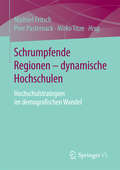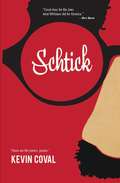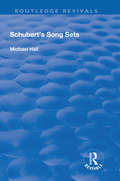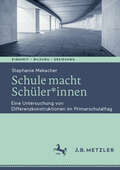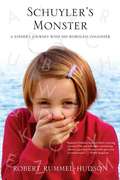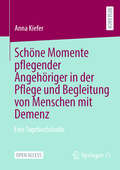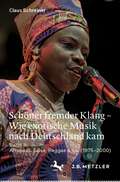- Table View
- List View
Schools of Thought: Twenty-Five Years of Interpretive Social Science
by Joan W. Scott & Debra KeatesSchools of Thought brings together a cast of prominent scholars to assess, with unprecedented breadth and vigor, the intellectual revolution over the past quarter century in the social sciences. This collection of twenty essays stems from a 1997 conference that celebrated the twenty-fifth anniversary of the Institute for Advanced Study's School of Social Science. The authors, who represent a wide range of disciplines, are all associated with the School's emphasis on interpretive social science, which rejects models from the hard sciences and opts instead for a humanistic approach to social inquiry. Following a preface by Clifford Geertz, whose profound insights have helped shape the School from the outset, the essays are arranged in four sections. The first offers personal reflections on disciplinary changes; the second features essays advocating changes in focus or methodology; the third presents field overviews and institutional history; while the fourth addresses the link between political philosophy and world governance. Two recurring themes are the uses (and pitfalls) of interdisciplinary studies and the relation between scholarship and social change. This book will be rewarding for anyone interested in how changing trends in scholarship shape the understanding of our social worlds. The contributors include David Apter, Kaushik Basu, Judith Butler, Nicholas Dirks, Jean Elshtain, Peter Galison, Wolf Lepenies, Jane Mansbridge, Andrew Pickering, Mary Poovey, Istvan Rev, Renato Rosaldo, Michael Rustin, Joan W. Scott, William H. Sewell, Jr., Quentin Skinner, Charles Taylor, Anna Tsing, Michael Walzer, and Gavin Wright.
Schools, Pupils and Special Educational Needs (Routledge Library Editions: Special Educational Needs #24)
by David GallowayFirst published in 1985. This book examines in-depth the administrative, curricular, attitudinal and pastoral care changes that are needed if teachers in ordinary schools are to meet their pupils’ special needs successfully. Drawing on extensive research the author shows that the needs of a minority of ‘special’ pupils cannot sensibly be seen in insolation from those of the other pupils in the school. Schools that cater successfully for the majority of their pupils with special needs. Conversely, the curriculum and organisational problems in some schools create tensions which are reflected in the pupils’ poor behaviour and performance. These are taken as evidence that the pupils have special needs.
Schreiben und Redigieren – auf den Punkt gebracht: Das Schreibtraining für Kommunikationsprofis und Corporate Writer
by Ivo Hajnal Franco ItemDas Buch bietet professionellen Schreiberinnen und Schreibern praxisnahe Anregungen, eigene wie fremde Texte zu optimieren. Ein professioneller Sprachgebrauch hält sich an klare, objektive Vorgaben. Dementsprechend beruht dieses Buch auf empirischen Daten zur Verständlichkeit von Unternehmens- und Medientexten, die in eine leicht umzusetzende Checkliste münden.
Schrift / Bild – Lesen: Interdisziplinäre Perspektiven für die Leseforschung (Abhandlungen zur Medien- und Kulturwissenschaft)
by Michael StaigerIm Zuge der gegenwärtigen Transformation hin zu einer digitalen, multimodal dominierten Medienkultur vollzieht sich ein Wandel des Lesens. Dieser betrifft nicht nur die Lesemedien und die Rezeptionsbedingungen, sondern auch die Medialität und Materialität von Texten. Im Mittelpunkt des Bandes steht die Frage, wie Texte gelesen werden, die Schrift und Bilder miteinander kombinieren. Vorgestellt werden Zugänge aus den Literatur-, Buch- und Medienwissenschaften, aus der Multimodalitätsforschung und Kognitionspsychologie sowie aus Kunstwissenschaft und Deutschdidaktik. Ziel ist es, das Forschungsfeld des Schrift-Bild-Lesens abzustecken und einen Beitrag zu seiner theoretischen Grundlegung zu leisten.
Schriften der Frühzeit: Gesammelt und herausgegeben von Gustav Mayer (Klassiker der Sozialwissenschaften)
by Friedrich EngelsDer Band macht die frühen Schriften Friedrich Engels wieder zugänglich. Gesammelt und herausgegeben von Gustav Mayer.
Schriften zur Grundlegung der Soziologie: Theoretische und methodische Perspektiven (René König Schriften. Ausgabe letzter Hand #11)
by René KönigDieser Band versammelt René Königs Überlegungen zur theoretischen und methodischen Grundlegung der Soziologie. In ihrer Gestalt als spezifische empirische Einzelwissenschaft will diese Soziologie "nichts als Soziologie" sein; dies schließt aber nicht aus, dass in der Soziologie, wie sie René König betreibt, den Erkenntnissen der Human- und Kulturwissenschaften eine zentrale theoretische Funktion zukommt. Auch zu grundsätzlichen erkenntnistheoretischen und methodologischen Problemen sowie zu Fragen einer Ethik der empirischen Soziologie und Sozialforschung nimmt König dezidiert Stellung.
Schriften zur Wissenschaftslehre und Kultursoziologie: Herausgegeben und eingeleitet von Peter Gostmann und Alexandra Ivanova (Klassiker der Sozialwissenschaften)
by Emil LedererDie Schriften von Emil Lederer zur Wissenschaftslehre stellen unverändert eine wichtige Ressource für die soziologische Grundlagenforschung dar. Seine kultursoziologischen Schriften sind ein wertvoller Leitfaden für die Gegenwartsanalysen heutiger Soziologinnen und Soziologen; zugleich bieten sie dem historisch interessierten Leser die Möglichkeit, einen vertieften Einblick in die Diskussionslage zwischen Sozialwissenschaften und Politik in der ersten Hälfte des 20. Jahrhunderts zu gewinnen.
Schriften: Herausgegeben von Christoph Henning (Klassiker der Sozialwissenschaften)
by Gottfried Salomon-DelatourGottfried Salomon-Delatour (1892-1964), ein heute fast vergessener Soziologe, promovierte 1916 bei Georg Simmel in Straßburg und war anschließend in Frankfurt Assistent von Franz Oppenheimer am ersten deutschen Lehrstuhl für Soziologie. In den 1920er Jahren war er als Herausgeber des „Jahrbuchs für Soziologie“ und Organisator der Davoser Hochschulkurse ferner mit fast allen Größen des Faches auch persönlich bekannt. Seit 1933 im Exil, war er weiter aktiv – auch politisch – und kehrte 1958 nach Frankfurt zurück. Er stellt ein Bindeglied zwischen seinen Lehrern Simmel und Oppenheimer einerseits und jüngeren Intellektuellen wie Benjamin und Adorno sowie den Studierenden der 1960er Jahre andererseits dar. Derzeit wird er auch als deutsch-französischer „Vermittler“ wiederentdeckt. Dieser Band macht einige seiner interessantesten Schriften erneut verfügbar. Darunter befinden sich einerseits einige „investigative“ Vorworte zu Herausgaben damals wenig bekannter internationaler „Klassiker“ der Soziologie und andererseits – neben Aufsätzen zu spezifisch jüdischen Themen – auch bewegende Dokumente aus seiner Zeit im Exil.
Schriftliche Besucherbefragungen im Kulturmarketing und Kulturtourismus: Praxis Kulturmanagement (essentials)
by Andrea Hausmann Sarah SchuhbauerDieses essential erläutert fundiert und kompakt die schriftliche Besucherbefragung als Instrument im Kulturmarketing und Kulturtourismus. Nach einer Einführung in die wichtigsten Begriffe werden die beiden Methoden schriftlicher Befragungen (Paper-Pencil und Online) anwendungsbezogen vorgestellt und auf ihre Stärken und Schwächen untersucht. Hierauf aufbauend werden die einzelnen Phasen von schriftlichen Befragungen – von der Gestaltung eines Fragebogens und der Datenerhebung über die Datenaufbereitung und -auswertung bis hin zur Follow-up-Phase – skizziert. Die theoretischen Erläuterungen werden anhand vieler aktueller Beispiele aus der Praxis von Kultur und Tourismus illustriert.
Schrumpfende Regionen - dynamische Hochschulen
by Michael Fritsch Peer Pasternack Mirko TitzePolitik und andere Akteure in den (vor allem ostdeutschen) Regionen stehen vor der Aufgabe, den demografischen Wandel zu gestalten. Dabei sollen sie zugleich die Voraussetzungen für ,,selbsttragende Entwicklungen" und ,,gleichwertige Lebensverhältnisse" schaffen - und dies unter Bedingungen bis 2020 deutlich abgesenkter Landeshaushalte. Vor dem Hintergrund dieser Herausforderungen werden Optionen für die Regionalentwicklung aufgezeigt, die im Zusammenhang mit Hochschulen stehen.
Schtick
by Kevin CovalSchtick is a tale of Jewish assimilation and its discontents: a sweeping exposition on Jewish American culture in all its bawdy, contradictory, inventive glory. Exploring-in his own family and in culture and politics at large-how Jews have shed their minority status in the United States, poet Kevin Coval shows us a people's transformation out of diaspora, landing on both sides of the color line.
Schubert's Song Sets (Routledge Revivals Ser.)
by Michael HallThis title was first published in 2003. From 1821 until his death, Schubert compiled or specially composed for publication 42 song sets, yet during his own lifetime, and until now, their integrity and importance as sets have been virtually ignored. In this book, Michael Hall asserts that these songs sets are not arbitrary collections, as so often assumed, but highly integrated works in their own right. Approaching these songs as sets the book throws light on Schubert's largely undiscussed intellectual preoccupations. They reveal that he was au fait with most of the philosophical concerns of his time, especially those which touched on Romanticism. But although the sets reflect Romanticism in their topics, Hall maintains that they are the epitome of classical balance. In encouraging students and performers to approach these songs as sets, this study aims to alter perceptions of this important repertory.
Schule als Fall: Institutionelle und organisationale Ausformungen (Rekonstruktive Bildungsforschung #25)
by Fabian Dietrich Mirja Silkenbeumer Saskia BenderKomplementär zu der sich in den letzten Jahren etablierenden und methodisch bzw. methodologisch ausdifferenzierenden Kasuistik mit dem Fokus auf unterrichtliche Interaktion widmen sich die Beiträge des vorliegenden Bandes der institutionellen, organisationalen Verfasstheit und diskursiver Rahmungen pädagogischer Praxis. Indem innerschulische Bearbeitungen und Ausdeutungen (neuer) bildungspolitischer Erwartungen und gesellschaftlicher Wandlungsprozesse das Zusammenhandeln und die Relationierung schulischer Akteure zueinander ‒ nicht zuletzt im Umgang mit jenen Erwartungen sowie Ausformungen des Schulischen in Relation zu aktuell dominanten Professionalisierungserwartungen ‒ untersucht werden, wird Schule zum Fall gemacht. In der Gesamtschau der Beiträge zeigt sich eine Bandbreite methodischer und methodologischer Perspektivierungen, vielfältiger empirischer Gegenstände und untersuchter Protokolle schulischer Wirklichkeit, welche das Feld schulbezogener qualitativ/rekonstruktiver Forschung prägt und für das Feld kasuistischer Lehrer*innenbildung fruchtbar gemacht werden kann.
Schule macht Schüler*innen: Eine Untersuchung von Differenzkonstruktionen im Primarschulalltag (Kindheit – Bildung – Erziehung. Philosophische Perspektiven)
by Stephanie MekacherDerweil sich diverse erziehungswissenschaftliche Studien mit dem Thema der interaktiven Konstruktion und Bearbeitung von Differenzen in schulischen Kontexten auf der Eingangs- oder Sekundarstufe befassen, ist die Frage, wie Differenzen im Schulalltag der Primarstufe hervorgebracht und (re-)produziert werden, im Bildungsraum Schweiz bislang kaum erforscht worden. Die vorliegende Studie beleuchtet doing difference Prozesse und die damit verbundene (Re-)Produktion von sozialen Ordnungen bzw. Ungleichheiten im schulischen Alltag. Anhand einer ethnographischen Herangehensweise wird eruiert, inwiefern in der Unterrichtspraxis zweier beobachteten Primarschulklassen der Deutschschweiz soziale, gender- und klassenbezogenen Differenzen thematisiert, hervorgehoben oder neutralisiert werden. Aus einer ethnomethodologischen Perspektive wird aus den erhobenen Daten rekonstruiert, wie die schulischen Akteur*innen Abgrenzungs- und Zuschreibungsprozesse vornehmen und wie sich diese auf die Positionierung der Individuen im sozialen Gefüge der Schulklassen auswirken. Ausgezeichnet mit dem Fakultätspreis 2023 der philosophischen Fakultät der Université de Fribourg.
Schule und digitale Kommunikationskultur: Antinomien des Lehrer*innenhandelns zwischen Privatheit und Professionalität (Medienbildung und Gesellschaft #Vol. 49)
by Philip KarschLehrer*innen, die mit ihren Schüler*innen über Messenger in Kontakt stehen? Ein Umstand, auf den bis vor der Coronapandemie zu Beginn des Jahres 2020 wahrscheinlich von vielen Seiten mit Irritation bis hin zu ablehnendem Kopfschütteln reagiert wurde. Das Distance Learning hat es notwendig gemacht, sich neue Wege der Kommunikation zu suchen. Auch nach der Pandemie wird es wahrscheinlich keine Selbstverständlichkeit sein. Wahrscheinlich werden von manchen Lehrer*innen Vorteile gesehen, aber zu welchem Preis? Kommunikation wird erleichtert, aber muss man denn wirklich noch abends für die Schüler*innen erreichbar sein? Für Probleme, die vielleicht gar nichts mit der Schule zu tun haben? Auch mag einem die Frage in den Sinn kommen, ob diese Art der Kommunikation zwischen Lehrer*innen und Schüler*innen grundsätzlich als angemessen gelten kann. Führt diese Kommunikation nicht auch ganz allgemein und breit gefächert zu Grenzüberschreitungen? Diese – und viele weitere – Fragen sind bis zum jetzigen Zeitpunkt sowohl rechtlich als auch administrativ, vor allem aber aus empirisch-erziehungswissenschaftlicher Perspektive weitestgehend unbeantwortet geblieben. Diese Arbeit möchte einen Beitrag dazu leisten, diese Lücke zu schließen. Im Mittelpunkt der Überlegungen und der empirischen Ausarbeitung steht dabei, wie die Nutzung von Messengern bekannte Konzeptionen von Privatheit, von Beziehungen zwischen Lehrer*innen und Schüler*innen und dem (schulischen) Raum berührt.
Schulische Inklusion als Phänomen – Phänomene schulischer Inklusion: Fachdidaktische Spezifika und Eigenlogiken schulischer Inklusion
by Martin Heinrich Bernd Gröben Michael Braksiek Kinga Golus Peter Schildhauer Lilian StreblowDas Buch liefert einen Einblick in fachbezogene Inklusionsdiskurse in nahezu jeder Fachdidaktik. Zudem werden für die jeweiligen Fachdidaktiken „typische“ Phänomene schulischer Inklusion herausgearbeitet und beispielhaft illustriert. Im Durchgang durch die unterschiedlichen fachdidaktischen „Aneignungsformen“ des bildungspolitischen Impulses der UN-BRK zur Institutionalisierung eines inklusiven Schulsystems zeigt sich, dass die disziplinären Eigenlogiken der Fächer durchaus wirksam sind, zugleich aber vielfältige schulpraktische Lösungen angeboten werden. So bietet das Buch insgesamt eine Synopse des fächerspezifischen Inklusionsdiskurses als Antwort auf die governanceanalytische Frage: „Was implementiert sich da eigentlich?“
Schulische Rassismuskritik: Zur Überwindung des Artikulationstabus in schulischen Organisationsmilieus (Pädagogische Professionalität und Migrationsdiskurse)
by Aylin KarabulutDie empirische Studie fokussiert zentrale Mechanismen der Tabuisierungen pädagogischer Professioneller, die das Sprechen über Rassismus an Schulen strukturell behindern. Neben theoretischen und empirischen Konstruktionen des schulischen Artikulationstabus werden ferner Möglichkeiten der Interventionen in das schulische Artikulationstabu herausgestellt und im Rahmen von Handlungsempfehlungen für rassismuskritische Transformationen evidenzbasiert weiterentwickelt.
Schutzian Phenomenology and Hermeneutic Traditions
by Michael Staudigl George BergunoSchutzian Phenomenology and Hermeneutic Traditions links Alfred Schutz to the larger hermeneutic tradition in Continental thought, illuminating the deep affinity between Schutzian phenomenology and hermeneutics. The essays collected here explore a broad spectrum of Schutzian themes and concerns, from Schutz's concrete affinities to hermeneutic traditions, his interpretationism and the pragmatist nature of Schutz's thought, to questions concerning the role of the media and music in our understanding of the life-world and intersubjectivity. The essays go on to explore the practical applicability of Schutz's thoughts on questions regarding economics, literature, ethics and the limits of human understanding. Given its emphasis on the application of Schutzian ideas and concepts, this book willbe of special interest to a wide range of readers in the social sciences and humanities, who are interested in the application of phenomenology to social, political, and cultural phenomena.
Schuyler's Monster: A Father's Journey with His Wordless Daughter
by Robert Rummel-HudsonWhen Schuyler Rummel-Hudson was eighteen months old, a question about her lack of speech by her pediatrician set in motion a journey that continues today. When she was diagnosed with bilateral perisylvian polymicrogyria (an extremely rare neurological disorder), her parents were given a name for the monster that had been stalking them from doctor to doctor, and from despair to hope, and back again. Once they knew why Schuyler couldn't speak, they needed to determine how to help her learn. They took on educators and society to give their beautiful daughter a voice, and in the process learned a thing or two about fearlessness, tenacity, and joy. More than a memoir of a parent dealing with his child's disability, Schuyler's Monster is a tale of a little girl who silently teaches a man filled with self-doubt how to be the father she needs. Robert Rummel-Hudson has been writing online since 1995. His work has been recognized by the Diarist Awards at diarist. net, including citations for Best Writing, Best Overall Journal, Best Account of a Public or News Event, Best Dramatic Entry, and the Legacy Hall of Fame Award. He has served three times as a featured panelist at JournalCon, an annual conference for online writers. His online writing has been featured in articles in the Austin Chronicle , the Irish Times and the New Haven Register . Robert and his family currently live in Plano, Texas. When Schuyler was 18 months old, a question about her lack of speech by her pediatrician set in motion a journey that continues today. When she was diagnosed with Bilateral perisylvian polymicrogyria (an extremely rare neurological disorder caused by a malformation of the brain), her parents were given a name for the monster that had been stalking them throughout the search for the correct answer to Schuyler''s mystery. Once they knew why she couldnâ t speak, they needed to determine how to help her learn. Schuylerâ s Monster is more than the memoir of a parent dealing with a childâ s disability. It is the honest, funny, and heart-wrenching story of the relationship between a unique and ethereal little girl and her father who struggles with whether or not he is the right dad for the job. It is the story of a family seeking answers to a childâ s dilemma, but it is also a chronicle of their unique relationships, formed without traditional language against the expectations of a doubting world. It is the story of a little girl who silently teaches a man filled with self-doubt how to be the father she needs. "A gripping explication, shot through with equal parts horror and hope, of how parenthood can turn ordinary people into passionate advocates. "â " Neal Pollack, author of Alternadad "Robert Rummel-Hudson is brave enough to reveal the damage the discovery of his child''s condition did to his marriage and to his own sense of self. He manages to repair some of the damage through close involvement with Schuyler and vigorous campaigning on her behalf. His memoir is honest, often painful and deeply personal. "â " Charlotte Moore, author of George & Sam "The book is engaging and honestâ "I''m sure it will help many parents who are struggling to find the most loving way to help their children who have â issues. â "â " Dana Buchman, author of A Special Education "The monster in this heartfelt memoir is polymicrogyria, an extremely rare brain malformation that, in the case of Rummel-Hudson''s daughter Schuyler, has completely impaired her ability to speak. During her first three years, as her parents seek to find out what hidden ''monster'' is causing her wordlessness, they endure ''two years of questions and tests and at least one unsatisfactory diagnosis. '' But while Rummel-Hudson initially rages at God for giving Schuyler ''a life that would never ever be what we''d imagined it to be,'' his depiction of her next four years becomes a study not only in Schuyler''s vivacious and resilient personality, but also in the redeeming power of understanding and a ''stup
Schwarzenegger: Uses of the Foreign Star
by Gábor GergelyThis book analyses the uses of Arnold Schwarzenegger as a foreign star in Hollywood through a film philosophical, de-westernizing and sonic critical framework. It offers very close readings of the film texts, of the roles Schwarzenegger performs, and the rhetorical strategies he adopts outside his film performances to show that in spite of attempts to occupy the position of an emblematic member of the U.S. national body Schwarzenegger remains irrevocably outside as an accented migrant body continuously accumulating markers of belonging that by their very necessity attest to their insufficiency. The book’s central project is to trace back, from the uses to which a migrant star such as Schwarzenegger is put on the screen, the construction of a sense or idea of a U.S. national community through the cinema. Given that the appeal to the American myth of an immigrant nation that promises to erase difference is fundamental to the Schwarzenegger star persona, the central aim of this book is to explore the uses of his stardom as an embodiment of the promise of America and its contradictions and exclusions.
Schweigen: Von der Kunst der Stille bis zur befohlenen Ruhe
by Theodor IttenStille und Schweigen sind im Alltag und in der Politik ständig präsent, aber warum sprechen wir so selten darüber? Wir lieben die Stille, die Ruhe, wenn wir sie brauchen, halten sie aber kaum aus, wenn wir ihr Gegenüber sind. Im Geheimnis verschweigen wir etwas, das uns beschützt und hilft zu leben. Auf der anderen Seite wird manches buchstäblich totgeschwiegen, das zur Sprache gebracht werden müsste, um Heilung zu ermöglichen. Untertanen werden mit diktatorischem Gehabe zum Schweigen gebracht – eine kommunikative Machtdemonstration.Dieses Buch beschreibt und analysiert aus sozialpsychologischer, kulturhistorischer und philosophischer Perspektive das menschliche Verhalten im Bezug zur Stille. Eindrucksvoll bringt der Autor zu Wort, was seine Erfahrungen, Gedanken, Textforschungen und Expertengespräche rund um dieses vielschichtige Thema hergeben, und lässt so neue, überraschende Verbindungen zwischen Stille, Schweigen und Ruhegeben entstehen. Ein erzählender Wegweiser mit nachdenklich stimmenden und amüsanten Erkenntnissen für alle Menschen, die dem Schweigen in all seinen Aspekten auf den Grund gehen möchten.
Schöne Momente pflegender Angehöriger in der Pflege und Begleitung von Menschen mit Demenz: Eine Tagebuchstudie
by Anna KieferIn diesem Open Access-Buch wird gezeigt, wie pflegende Angehörige mit Hilfe einer Tagebuchvorlage auf die Wahrnehmung schöner Momente in der Begleitung ihrer an Demenz erkrankten Familienmitglieder sensibilisiert werden können. Tagebücher sind eine beliebte Möglichkeit zur Verarbeitung und Bewältigung von Krisensituationen und können dabei der Selbstreflexion und Belastungsverarbeitung dienen. Insbesondere positives Schreiben kann durch das Erinnern und Reflektieren schöner Momente und Emotionen nachweislich zu einem höheren Wohlbefinden und zur Steigerung der Selbstwirksamkeit führen. Die Begleitung eines Menschen mit Demenz geht für pflegende Angehörige häufig mit einer Vielzahl an Belastungen und Herausforderungen einher, weshalb diese häufig aus der Belastungsperspektive erlebt wird. Schöne Momente innerhalb der Sorgebeziehung zwischen pflegenden Angehörigen und Menschen mit Demenz werden dabei seltener bewusst wahrgenommen. Die Ergebnisse der Tagebuchstudie zeigen individuelle Auswirkungen der Wahrnehmung und Sensibilisierung schöner Momente.
Schöner fremder Klang – Wie exotische Musik nach Deutschland kam: Band 1: Ragtime, Tango, Rumba & Co. (1855–1945)
by Claus SchreinerIn seiner großen Geschichte der ‚exotischen‘ populären Musik beschreibt Claus Schreiner den transatlantischen Weg all der uns heute vertrauten Musikstile von ihren Ursprüngen nach Europa und Deutschland. Er berichtet im ersten von drei Bänden, wann und wie es zu ersten Begegnungen von Europäern mit afroamerikanischen Künstlern kommt und wie Charleston, Ragtime, Jazz, Tango, Maxixe, Rumba, Biguine in Kolonialzeiten und in den Küstenstädten Lateinamerikas entstehen. Die Aufnahme, Anverwandlung und Amalgamierung der vielen fremden Musikstile in den Metropolen Europas wird im Hauptteil des Buches lebendig und mit vielen Künstlerbiographien, Songtexten und Geschichten beschrieben. Wie gingen die Deutschen zwischen Kaiserreich und NS-Staat mit den exotischen Tänzen und den Künstlerinnen und Künstlern um? Welche Rolle spielten Musikethnologie, Unterhaltungsindustrie, Zeitgeist und die Folgen von Krieg, Kolonialzeit und Nationalsozialismus? Das Buch zeichnet ein deutliches Bild von der überragenden Rolle der ‚exotischen‘ Musik für die populäre Kultur der Moderne.
Schöner fremder Klang – Wie exotische Musik nach Deutschland kam: Band 2: Samba, Mambo, Bossa & Co. (1945–1975)
by Claus SchreinerIn seiner großen Geschichte der ‚exotischen‘ populären Musik beschreibt Claus Schreiner den transatlantischen Weg all der uns heute vertrauten Musikstile von ihren Ursprüngen nach Europa und Deutschland. Der zweite Teil beginnt mit der Nachkriegszeit. Die Isolation Deutschlands von vormals verbannten ‚exotischen‘ Einflüssen endet. Träume von einsamen Inseln werden im Nachkriegs- und Wirtschaftswunderland nicht nur von einfältigen Schlagertexten, sondern auch von Samba, Baião und Bossa Nova aus Brasilien bedient, dann kommen Mambo und Chachachá aus New York und Kuba und der Calypso. Auf deutschen Bühnen zeigen Tanz-Ensembles aus den jungen afrikanischen Staaten, aus Brasilien, Mexiko und Korea Mischungen aus Folklore und Ballett. Aus den USA weht die Folk-Welle herüber und initiiert nicht nur Festivals wie Waldeck, sondern auch erste Begegnungen mit internationaler Folklore, denen Protestsongs mit den Krisen der sechziger Jahre folgen, an die sich in einer Welle der Solidarität Musik chilenischer Exilgruppen und der Künstler aus anderen lateinamerikanischen Diktaturen anschließt. Mit El Condor Pasa beginnt die Invasion der Poncho-Gruppen in die Fußgängerzonen.
Schöner fremder Klang – Wie exotische Musik nach Deutschland kam: Band 3: Afrobeat, Salsa, Reggae & Co. (1975-2000)
by Claus SchreinerIn seiner großen Geschichte der ‚exotischen‘ populären Musik beschreibt Claus Schreiner den transatlantischen Weg all der uns heute vertrauten Musikstile von ihren Ursprüngen nach Europa und Deutschland. Der dritte Band beginnt mit der Musik Afrikas und ihrer Ankunft in Europa. Back to Africa: Reggae-Wurzeln und die deutsche Szene, wo das Interesse nicht nur an den Urvätern des Reggae wächst. Man will mehr Originale erleben, traditionell oder populär, und schafft neue Festivals, die oft mit Workshops und Informationen begleitet werden. Das New Age-Zeitalter beginnt und lässt Musiker in esoterischen Quellen schöpfen. Japanische Trommelgruppen lassen Konzertsäle erbeben und Butoh-Tänzer erinnern an den Ausdruckstanz der zwanziger Jahre. Musik aus vielen ‚exotischen‘ Wurzeln bietet sich als Alternative zu Belanglosem in Spaßgesellschaft, Disco und Neuer Deutscher Welle und als Begleitung von Aktionen gegen Rassismus, Hungersnöte und Fremdenfeindlichkeit an. Salsa aus Puerto Rico und New York bringt endlich mehr Körperlichkeit in deutsche Tanzclubs und bereitet den Boden für nostalgisches Buena Vista-Feeling, das von Modetänzen wie Lambada, Merengue und Zouk abgelöst wird. Latinmusic sorgt auch in Deutschland für Hits. Am Ende des Jahrhunderts ist das Angebot überreichlich vorhanden und man nennt es Weltmusik.
